The Future of Europe and the Transatlantic Link
On November 14th, 2016, the Stockholm Free World Forum hosted its yearly conference. This year, the theme was The Future of Europe and the Transatlantic Link. The conference aimed to discuss the unstable situation in which Europe and the transatlantic relationship currently find themselves. Specific topics included the future of transatlantic security, the prospects for European cooperation, the rise of populism and authoritarianism as well as the impact of post-truth and information warfare on the transatlantic community.
Below is a list of speakers.
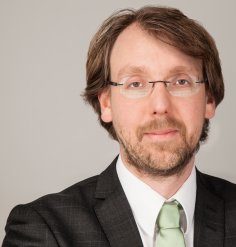
Andreas Johansson Heinö is Head of Publishing at Timbro. He holds a PhD in Political Science and is the author of several books and reports on nationalism, populism and democracy. His latest book “Farväl till folkhemmet” (2015) scrutinizes Sweden’s transition from a homogenous welfare state to a multicultural country of immigrants. Andreas is also an expert on European populism and the author of Timbro’s Authoritarian Populism Index.
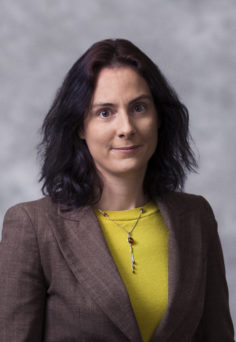
Anke Schmidt-Felzmann is a Researcher at the Swedish Institute of International Affairs (Utrikespolitiska institutet, UI) in Stockholm. She previously worked as an In-Service trainee at the European Commission’s now defunct External Relations Directorate General dealing with Russia, Ukraine, Moldova and Belarus, at Schleswig-Holstein’s State Chancellory’s unit for Baltic Sea regional cooperation, and for the secretariat for the Council of Baltic Sea States in Stockholm. She holds a PhD in Politics from the University of Glasgow (2011) and an MSc in International and European Politics from the University of Edinburgh. She has held research and teaching positions in the UK, the Netherlands and Sweden as well as visiting research positions in Latvia, Estonia, Denmark, Norway, Germany and Finland.
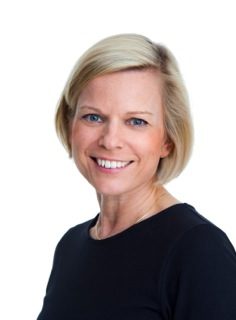
Anna Wieslander is Director for Northern Europe at the Atlantic Council and concurrently serves as Secretary General of the Swedish Defence Association. She was previously Deputy Director at the Swedish Institute of International Affairs (Utrikespolitiska institutet, UI). Anna Wieslander has held positions as Head of the Speaker’s Office in the Swedish Parliament, Secretary of the Swedish Defence Commission and Deputy Director of the Swedish Defence Ministry. Her expertise is in security and defence policy, NATO and PfP, the transatlantic link, and issues affecting the defence industry.
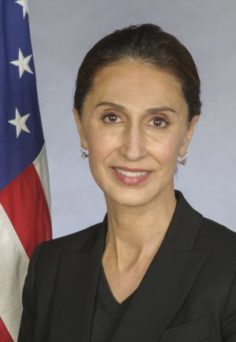
Ambassador Azita Raji was unanimously confirmed by the United States Senate as U.S. Ambassador to Sweden on February 12, 2016. Born in Iran, she has lived, studied, and worked in the Middle East, Europe, and the Far East and is fluent in several languages. Ambassador Raji earned a B.A. from Barnard College, Columbia University in 1983, and an M.B.A. from Columbia Business School in 1991.
Prior to being nominated by President Obama to represent the United States in Sweden, Ambassador Raji served in various leadership roles on national non-profit boards and commissions in the United States. As a former investment banker, Ambassador Raji has extensive experience in U.S. and global financial markets, and held senior executive positions on Wall Street. During the 2012 presidential elections, Ambassador Raji served as National Finance Vice Chair and Chair of the Swing State Victory Fund for the Obama campaign.
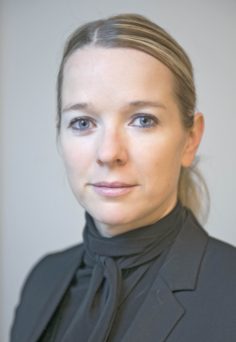
Ambassador Diana Janse has been the Senior Foreign Policy Advisor to the Moderate party’s leader Anna Kinberg-Batra since October 2015. She has been with the Swedish Ministry for Foreign Affairs for sixteen years, having been ambassador to Georgia and Armenia from 2010-2014 as well as ambassador to Lebanon and chargé d’affairs in Syria from 2014-2015. She has also served in the cabinet of the Foreign Minister Carl Bildt and has had posts in Moscow, Kabul and Brussels, among others. Before becoming a diplomat, she worked for the Armed Forces Headquarters and the Ministry of Defence.
Ms Janse holds two degrees, a Bachelor of Arts in Slavic languages and a Master’s degree in Social Sciences, both from Uppsala University. Ms Janse is the author of “En del av mitt hjärta lämnar jag kvar” (Alfabeta förlag 2010), a book about her years in Afghanistan (2004-2006).

Håkan Jonsson is a former diplomat and politician and currently an advisor on EU and political affairs at leading Swedish communications consulting firm Hallvarsson & Halvarsson. Mr. Jonsson has served as State Secretary for European Affairs at the Prime Minister’s Office, working for then-European Affairs Minister Cecilia Malmström. He has been posted overseas as a diplomat in Jakarta, Indonesia and in Brussels to the European Union. He was the head of a task force in the Swedish Parliament for the four Swedish Riksdag Members and Alternates of the European Convention, and held the position of Deputy Director General and Head of the Internal Market Department at the National Board of Trade/Kommerskollegium.
He has contributed papers and analyses to think tanks such as SIEPS and Global Utmaning. He has given lectures and presentations as well as moderated debates at Stockholm and Uppsala University, SIEPS, Frivärld, Global Utmaning, SNS, Breugel (Brussels), Notre Europe (Paris), Fondation de l’innovation politique (Paris), and École nationale d’administration (Strasbourg). Mr. Jonsson holds a Master of Laws from Stockholm and Lund University and has attended a post-graduate EU Law course at the Collège d’Europe in Bruges.
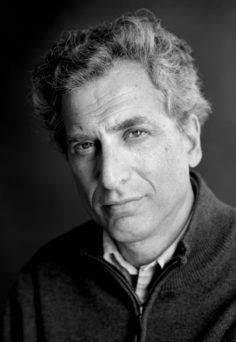
James Traub is a journalist and scholar specializing in international affairs. He is a columnist and contributor to the website foreignpolicy.com. He worked as a staff writer for The New Yorker from 1993 to 1998 and as a contributing writer to The New York Times Magazine from 1998 to 2011. He has also written extensively about national politics, urban affairs, and education. Among his recent books are The Freedom Agenda, on the American policy of democracy promotion, and The Best Intentions, on the UN under Kofi Annan. His most recent book, the widely acclaimed John Quincy Adams: Militant Spirit, is a biography of a figure who spanned the period from the Revolution to the dawn of the Civil War, and did much to define that era. He teaches classes on American foreign policy and terrorism at NYU’s Abu Dhabi campus, as well as a class on the political essay at NYU’s main campus in New York.

Jessikka Aro is an award-winning investigative reporter for Yle Kioski, the social media division of the Finnish Broadcasting Company YLE. Her specialty subjects are Russia, information warfare, security and extremism. Aro started a crowdsourced investigation of pro-Russia info war trolls in September 2014, which immediately resulted in her becoming a target of serious harassment by pro-Kremlin propagandists.
Aro has been awarded with the respected Bonnier Journalism Prize for her troll articles, which were published in Finnish, English and Russian. Aro is a popular conference speaker and contributor to various projects regarding freedom of the press. She constantly trains reporters and general public to recognize disinformation in Finland and abroad. Before YLE Aro worked as foreign affairs reporter in Finland’s largest daily Helsingin Sanomat (2008-2011) and as staff writer in Journalisti, the professional magazine of the Union of Journalists in Finland (2011-2013). At the moment Aro is writing an investigative book about Russian hybrid warfare targeted towards the West.
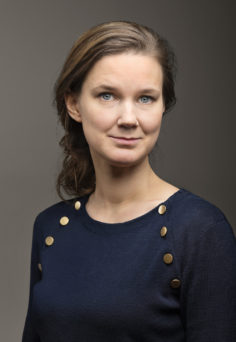
Karin Svanborg-Sjövall is the CEO of the think tank Timbro. Karin has a BA in political science and European studies and is one of Sweden’s foremost experts on welfare policy. In 2010 she published the book Private Choice in the Public Sector – The New Swedish Model, which was presented in English at The Guardian’s Public Leaders’ Summit in 2012. Karin is a frequent commentator in Swedish and international media, including The Economist, The Guardian, the BBC and Le Figaro. Prior to joining Timbro Karin was the chief of staff for Folkpartiet’s office (The Liberal Party) in the European Parliament in Brussels and a political advisor to the center-right government’s Minister for Research and Higher Education. She has also written opinion pieces for Dagens Nyheter, Sweden’s leading daily newspaper, as well as a number of other daily and evening newspapers.

Katarina Tracz is the director of Stockholm Free World Forum (Frivärld). She possesses wide experience in foreign and security policy analysis, focusing particularly on security in the Nordic-Baltic region. She is an active contributor to the debate on foreign and security policy in Swedish and international media, and has published several reports, articles and op-eds in major Swedish newspapers. Katarina is the author of the recently published book “Sea of Peace? Increased Tensions around the Baltic Sea” (Swedish: Fredens hav? Ökade spänningar kring Östersjön”). She is a member of the board of the Swedish Atlantic Council and the General Defense Association. Katarina’s prior experience includes working with press and communications for the Swedish Ministry for Foreign Affairs. She is a native Polish and Swedish speaker and is fluent in English and French.
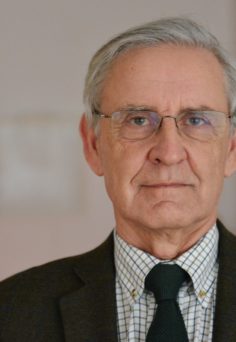
Karlis Neretnieks is a Major General (ret.) and is presently conducting research on security in the Baltic Sea region. He is fellow of the Royal Swedish Academy of War Sciences. From 1998 to 2002, he was President of the Swedish National Defence College. He has also served as Special Advisor to the Swedish Defence Minister on Baltic Security (2002–2004), Chief of Operations in the Central Joint Command (1997–1998), Commander of the Swedish Armed Forces International Centre (1994–1997) and Commander of the 18th Mechanised Brigade (1992–1994). Apart from attending both the Swedish and Norwegian Staff Colleges he has also pursued academic studies on European security at the Graduate Institute in Geneva.
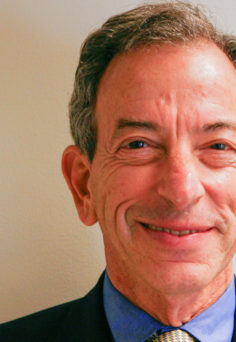
Leo Michel is a Visiting Senior Fellow at the Finnish Institute of International Affairs in Helsinki and a non-resident Senior Fellow at the Atlantic Council in Washington. His research focuses on transatlantic defense relations. Before joining the Council in July 2015, Mr. Michel was a Distinguished Research Fellow at the Institute for National Strategic Studies, the think tank component of the U.S. Defense Department’s National Defense University. From 1986-2002, Mr. Michel served in the Office of the Secretary of Defense as Director for NATO Policy, Director for Non-Nuclear Arms Control, Deputy U.S. Representative to the U.S.-Russia Bilateral Consultative Commission, Deputy Director of Verification Policy, and Defense Department Representative on the faculty of the Geneva Centre for Security Policy. In 2000 Mr. Michel was promoted to the Senior Executive Service. Before joining the Defense Department, Mr. Michel served in the CIA’s Directorate for Intelligence.
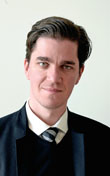
Martin Kragh is is head of the Russia and Eurasia Program at the Swedish Institute of International Affairs. Kragh’s research interests include Russia’s economy and history as well as political developments in Russia and the former USSR. Martin Kragh holds a PhD from the Stockholm School of Economics (2009) and is associate professor (docent) at the Uppsala Centre for Russian and Eurasian Studies. Kragh is also the research leader for the Uppsala Forum on Democracy, Peace and Justice and a member of the board of directors of Transparency International Sweden and the Sverker Åström Foundation.
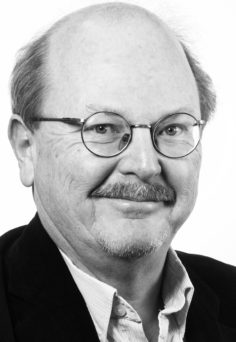
Mats Johansson founded the Stockholm Free World Forum in 2011. At that time he was a Member of Parliament serving on the Foreign Affairs Committee (2006-2014) for the governing Moderate party. As a Standing Rapporteur in the Parliamentary Assembly of the Council of Europe 2011-2013 he published a report about the state of media freedom in Europe. As chairman of the Swedish parliamentary network for the Baltic states he has been decorated by the republics of Estonia, Latvia and Lithuania.
In 2015 Mats started the Stockholm Free World Forum’s Foreign Policy Academy, creating an educational unit of the think tank for students and young politicians and serving as the academy’s first principal. Mats has also returned to journalism as a columnist in various papers and magazines. He has also been a member of The Mont Pelerin Society since 1990. He has previously served as Political Editor-in-Chief of the leading daily Svenska Dagbladet and as CEO/Publisher of the free market think tank Timbro.
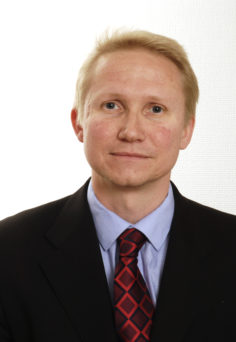
Mikael Tofvesson has been the head of the Global Monitoring and Analysis Section at the Swedish Civil Contingencies Agency (MSB) since January 2011. He is responsible for MSB activities that identify and counter information influence activities. He previously worked as Deputy Head of the Section and Head of Analysis in 2009 and 2010. In 2007 and in early 2008, he was Chief J2X at the Nordic Battle Group (F)HQ. Between 1989 and 2007, Mr. Tofvesson held various positions within the Swedish Military Intelligence and Security Directorate. He holds a bachelor’s degree in Cultural Anthropology from Stockholm University.
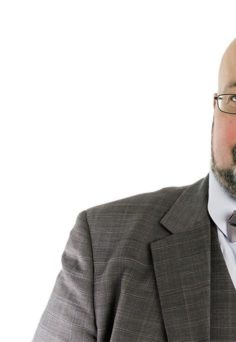
Patrik Oksanen is an editorial writer for MittMedia Corporation, the largest regional newspaper group in Sweden. His articles focus on security, defense and European affairs. He is also the political editor for the news site Helahalsingland.se and has extensively covered Russian influence on the extreme right and left movements in European politics, information warfare and propaganda, and developments in the Baltic Sea region. He is also a producer of Podd72, a podcast covering the same issues. Oksanen was a former European Union correspondent in Brussels for Swedish public service television’s (SVT) regional division and held various positions at SVT and commercial broadcaster TV4 as a producer and project manager. Oksanen recently published a piece on information warfare and how democracies should handle this challenge in Trolltider, an anthology of essays from Stockholm Free World Forum.
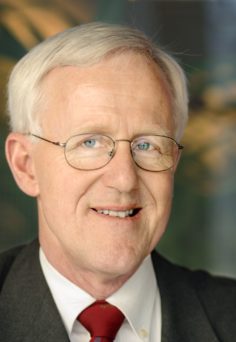
Ambassador Sven-Olof Petersson retired in 2014 after 43 years of diplomatic service. He now works part time as the Chairman of the Stockholm International Peace Research Institute (Sipri) and teaches diplomacy at the Folke Bernadotte Academy. During his diplomatic career he held many positions such as head of the Cabinet of the Foreign Minister as well as the Political Director and Swedish Ambassador to the European Union in Brussels. He has also served in Beirut, Dar es Salaam, Algiers, Strasbourg, Washington and Canberra.